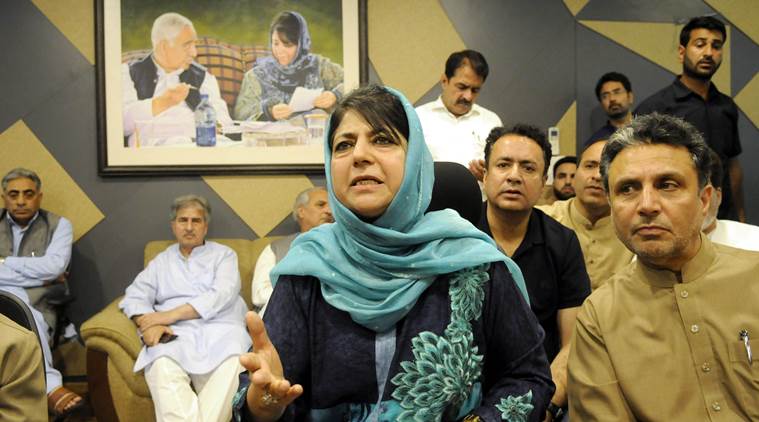A betrayal in the Valley
Every time Governor’s Rule has been imposed in J&K, situation has worsened, alienation has grown

Chief Minister Mehbooba Mufti addressing the media in Srinagar. (Express Photo by Shuaib Masoodi)
According to writer and philosopher George Santayana, history repeats itself. This concept ought to guide our political, administrative, public and private policy.
With the imposition of Governor’s Rule in Jammu and Kashmir, history has repeated itself. The mighty Union government has pulled the strings and the party governing the Centre has assumed powers, through the governor, by dumping a regional ally due to the distrust and difference in their respective approaches to the situation. In what was widely described as a great reconciliation between two politically divergent ideologies, across regional and political lines, Mufti Mohammad Sayeed was sworn as the 49th Chief Minister of Jammu and Kashmir, ending 49 days of Governor’s Rule, imposed after the hung poll results, on March 1, 2015.
The beginning of bonhomie between the Jammu and Kashmir Peoples Democratic Party and the Bharatiya Janata Party was marked in the presence of Prime Minister Narendra Modi. This was one of the rare occasions when the PM was part of government formation in a state, where his party had entered into an alliance with a regional organisation. Besides him, BJP national president Amit Shah, former president Lal Krishna Advani, Murli Manohar Joshi, Union minister Jitendra Singh, Haryana Chief Minister Manohar Lal Khattar were among the dignitaries present on the occasion. The indications were clear: That the new government in Jammu and Kashmir had the blessings of the prime minister himself, who had received a huge mandate from the people to govern India.
After his demise, his daughter, Mehbooba Mufti, took over the reins of power, continuing the alliance her father had forged. Despite her initial reluctance, she chose to honour the commitment of her father to implement the Agenda of Alliance that the two parties had formulated as a guide for governance in the state. The AoA was considered to be the first success of Sayeed who managed to make the BJP agree to not fiddle with Article 370 and hold dialogue with Pakistan and separatists to resolve the Kashmir issue.
During the course of governance and despite a severe dent to its popularity, the PDP stood its ground with regard to the core issues, including reconciliation, dialogue and its repeated assertions that Pakistan has to be on board if the peace process is to succeed in Kashmir.
At the cost of her image and reputation, the outgoing chief minister managed to bargain amnesty for more than 11,000 stone-pelters, appointed an interlocutor to start “internal dialogue with the stakeholders” and most recently the Ramadan ceasefire. Her persistent demand for continuation of the ceasefire in Kashmir was overturned by the Union government. The security agencies had, in fact, put their weight behind her argument that stopping counter-insurgency operations has managed to break the cycle of violence but the Union government had its way. The change was visible when the Union Home Minister Rajnath Singh addressed a gathering of more than 7,000 enthusiastic youth in the heart of Srinagar city. It was for the first time that separatists had not called for a strike on the visit of the Union home minister to the Valley, indicating a softening of their stand.
On the development front, the Mehbooba Mufti government was able to take some historic measures, including commitment of a Rs 80,000 special financial package from the Centre, establishing of cluster universities, two IIMs and IITs in the twin capital cities, launching of the process for opening five new medical colleges, legislation for establishment of the first-ever National Law University in the state, establishment of the Architecture and Planning School, regularisation of around 60,000 daily rate workers, regularisation of NYC volunteers (abandoned by the previous government), 6 per cent reservation to the weaker sections of society, 3 per cent reservation to the Pahari community, reorganisation of the third gender as a separate category giving them status at par with those living in Rural Backward Areas (RBA), two ring roads for Jammu and Srinagar cities, waiving of 50 per cent on Kisan Credit Card loans, cadrisation of Kashmir Police Service officers, bringing KPS officers at par with the counterparts in the civil administration (KAS), 7th Pay Commission to the state government employees, establishment of a separate Tribal Affairs Ministry, implementing the insurance scheme, ASRA, marriage assistance, Ladli Beti and Scooty schemes besides waiver of registration fee for women buying property.
As the alliance came to an end on Tuesday with the BJP pulling out of the government and Mufti submitting her resignation to the governor, there is a general perception in the state that the PDP’s “peace approach” had become a final bone of contention between the alliance partners. The chief minister was considered to be a stumbling block by the Union government in dealing with the Kashmir situation with full military power. Delhi was not ready to buy her persistent argument against a “muscular approach”.
Governor’s rule is not new to Jammu and Kashmir. It has been imposed seven times before. However, history bears witness that each time the Centre took this decision the situation went from bad to worse, people were alienated further, faith in the democratic set-up suffered a major dent and political processes and institutions were the first victim. The parties governing from Delhi have not learnt lessons from the past. The BJP did to Kashmir what the Congress had earlier experimented with. It took more than two decades for the regional political parties to restore the faith of the people in the democratic set-up — only to be shattered again.
Democracy will be restored. The political system will be back on track. The institutions will resume their functioning. However, this Tuesday of July 2018 will go down in history as another day of betrayal and deceit. Kashmir will again be at the receiving end.
The writer is member of Jammu and Kashmir Legislative Council from the PDP. Views are personal
For all the latest Opinion News, download Indian Express App







































No hay comentarios:
Publicar un comentario